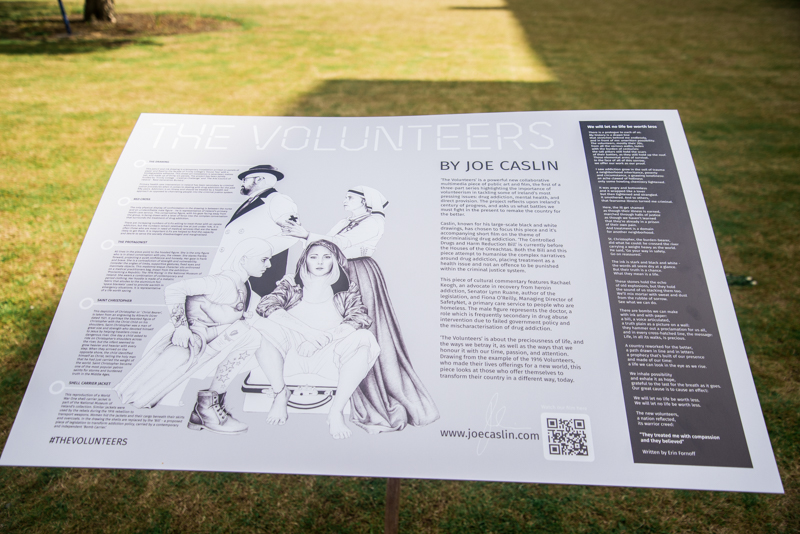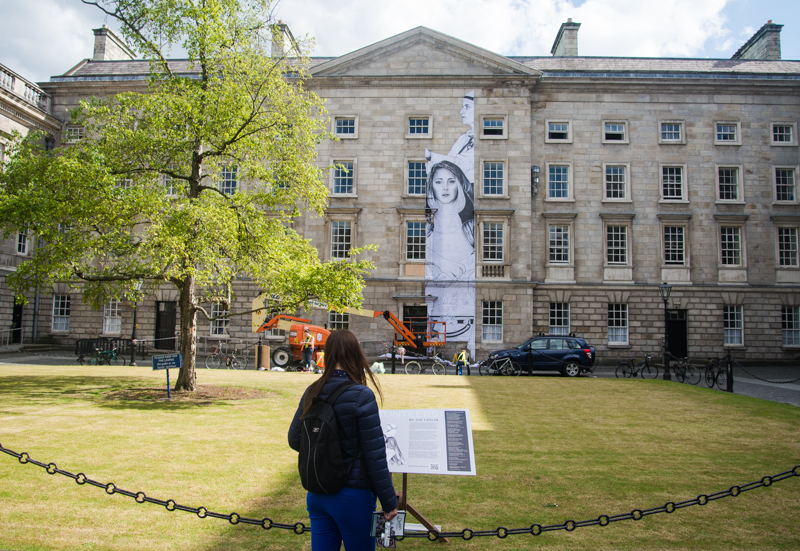Work has begun on Irish artist Joe Caslin‘s latest political project, a four-storey mural in Front Square that, featuring former Trinity student and current Trinity Senator Lynn Ruane, will act as a month-long call for change in Ireland’s approach to drug policy.
Entitled “The Volunteers”, a theme riffing on last year’s 1916 centenary celebrations, the work, which dominates the facade of the building to the east of Front Arch, will, when complete, show the four figures symbolising the historic struggle for drug reform, from the “protagonist”, who suffers from an addiction, to the politician, Lynn Ruane, who is trying to overturn the traditional approach to drug treatment.
Speaking to The University Times today, Caslin, known nationally for his work promoting social activism, particularly in the run up to 2015’s marriage equality referendum, said the mural, which represents “the people in the conversation around drug addiction”, was about engaging people in the discussion about how Ireland treats drug addicts.
Caslin said that, for years, attempts to change the approach to those suffering from addiction had faced reluctance and uneasiness from healthcare professionals, likening the current understanding of drug addiction to that of mental health care a few years ago. It is evident that there needs to be long-term addiction solutions for those who are suffering daily with issues of legal and illegal drugs.
Drug addiction, he said, is addressed primarily through the courts in Ireland, as “something to be punished”. Work on the mural will be completed by Sunday morning and will remain on the wall for the next month, making it an overt and very public addition to the campaign for drug treatment reform at a time when thousands of visitors from around the world are expected to visit Trinity as peak tourist season begins.
The mural has been funded and commissioned by the Trinity Creative Challenge. Sponsored by the Provost, the award provides financial support for artistic and creative projects. Five proposals were selected to share the 2016-2017 award fund of €40,000.

For Caslin’s project, three murals will be put up across Dublin addressing three distinct social issues: drug addiction, mental health and direct provision. The Trinity installation, modelled off a photograph taken in Trinity’s Long Room, will, Caslin hopes, contribute to a “political and public shift” in the country’s treatment of addiction. The ambitious project has also received funding from the Arts Council of Ireland.
Ruane, who in the mural, is dressed in the style of a female 1916 volunteer, carries a bill instead of the more traditional ballistics or bombs that might have been carried 100 years ago. Caslin first contacted her a year ago and the pair have been working on the project since, in parallel with the development of Ruane’s own bill on drug treatment.
Ruane’s Private Member’s Bill to the Seanad, entitled the Controlled Drugs and Harm Reduction Bill 2017, provides for the decriminalisation of the possession of controlled drugs for personal use. It would establish a Drug Dissuasion Service to case-manage those found in possession of these drugs, decriminalising possession by focusing on harm reduction measures, including drug awareness, rehabilitation and community engagement programmes.
The bill, which is supported by the Labour Party, the Green Party and independent senators and is co-signed and seconded by Senator Aodhán Ó Ríordáin, former Minister of State for the National Drugs Strategy, was debated in the Seanad on May 31st.
Ruane accepted a government compromise to postpone passing the bill until the expected publication of the National Drugs Strategy in the coming weeks. In a statement on her Facebook page, Ruane stated that she was “disappointed” and believed that we could have passed. “This is not the end of the campaign. Decriminalisation is the next logical step in embracing compassionate change for Irish drug policy and I’ll be continuing to work with allies in the Oireachtas to achieve this goal”, Ruane stated.
Ruane was elected as an independent senator to the University of Dublin constituency of Seanad Éireann in April 2016 when President of Trinity College Dublin Students’ Union (TCDSU).
Caslin is best known for his work in support of a yes vote in 2015’s marriage equality referendum, with his mural on George’s St becoming one of the most iconic images of the country’s path to becoming the first country in the world to legalise same-sex marriage by popular vote.
This is not the first time that Trinity has played host to Caslin’s work. In 2014, Caslin plastered a 42-ft work depicting a young man above Trinity’s Nassau St entrance as part of his “Our Nations Sons” project. The project, which installed large-scale portrait drawings of young men throughout the country, aimed to highlight how society can create feelings of isolation, neglect and apathy in young men.







